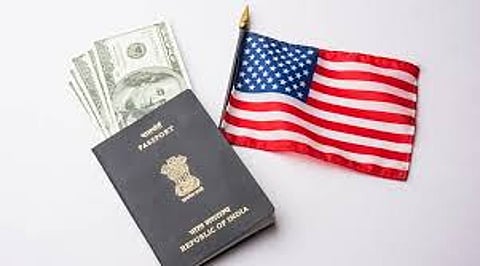

The sheen on the American Dream of a life of prosperity and professional advancement is wearing off for large numbers of Indian techies. For lakhs of Telugu youth, who've sunk their life's savings and incurred huge student loans for a U.S. Master's degree, the formerly clear pathway to a well-paying software position and an H-1B visa is now a minefield. The obstacles are multidimensional, the result of a mix of economic recessions, a tightening job market, and more stringent immigration laws.
Evidence indicates that Indians form the largest number of international students in the US, and a whopping 56% of them come from the Telugu-speaking Telangana and Andhra Pradesh states. Such a high concentration of this population implies that any policy change in the US weighs tremendously on this group.
Trump-Era Rollercoaster
The Trump administration's position on immigration, specifically on the H-1B visa program, sent Indian students into a panic. The potential increase in the H-1B visa fee to an astonishing $100,000 was the stuff of nightmares. It was betrayal for many. Students who had been courted by American firms with offers of employment and verbal promises were left hanging, as companies grew reluctant to go ahead with sponsorship in the wake of such ambiguity.
"A company sent me a job offer letter, but after the Trump announcement, informed me that I should wait for their next mail to join," cried a North Telangana student. "Months went by with no news. I had some other interview calls, but I did not follow them up owing to a sense of loyalty towards the first company. Now I am in a very precarious position."
This feeling was pervasive. The relief that came when the fee increase was finally revoked was great, but it did not completely dispel the abiding fear of what the future held. The experience also underscored a new vulnerability for families and students who had risked everything on their American education.
Job Market Shortage and Visa Instability
The H-1B visa, by which U.S. employers may hire foreign workers temporarily in specialty occupations, has an 85,000 cap per fiscal year. The number of petitions, however, is far more than this, and hence a lottery system. For Master's-degree-completed Indian students, acquiring employment and an H-1B visa has become extremely challenging.
The current economic climate, marked by a wave of layoffs across the U.S. tech industry, has exacerbated the problem. A report by a global consulting firm revealed that tech sector layoffs in 2023 were a direct result of a post-pandemic recalibration of workforce needs, impacting thousands of H-1B visa holders and new graduates.
Students who came on an F-1 visa are allowed to remain in the U.S. for one year after Master's, with another 24-month extension through the Optional Practical Training (OPT) program if they're in a STEM area. This gives a valuable three-year window to obtain an H-1B sponsorship. However, with intense competition for few available jobs, most of the students today are back to confronting the harsh reality of having to head back to India. The aspiration of settling down has been eclipsed by the immediate need to find a job, with many opting for PhD or other courses simply to prolong their stay and gain some additional time.
Social Ripple Effect: Cancelled Weddings
The H-1B visa crisis has not only affected working lives but has also caused a major social and personal disruption. One such poignant fallout is the deferment or cancellation of weddings. The tale of one Hyderabad student, whose wedding plans with a U.S.-based fiancé were left in shambles, is a familiar tale. As going back to India might result in the loss of their right to return to the U.S., numerous young couples either postpone their weddings endlessly or have family members go to the U.S. to perform the ceremonies. It has placed a tremendous psychological burden on the families as well.
Parents who have spent so much money on their children's education are now anxious, not just about their investment, but also about their future. The earlier provision of being able to work part-time in order to cover some of the living costs has also become more limited, leaving parents under higher financial stress.
Glimmer of Hope: Govt Set up Call Canters
To address the increasing distress, the government of India has intervened. The Ministry of External Affairs has set up special call centers for Indian citizens in trouble with regard to H-1B visas, an initiative that indicates the government has finally woken up to the gravity of the situation.
U.S. Call Center: 1-202-550-9931
New York Call Center: 1917-815-7066
Whereas this provides a support network, the short-term solution for most students is figuring out how to remain and work legally. Some American colleges are even taking on these talented students as part-time faculty to instruct undergraduate engineering classes, offering them a temporary lifeline and chance to receive a stipend. This innovative fix, albeit short-term, is allowing many to weather the storm.
Finally, the H-1B crisis is a vivid reminder that even the best of plans can go awry with global politics and economic changes. For the thousands of clever, young Indian minds who migrated over an ocean in quest of better prospects, the road is now less about reaching there and more about coping with a rapidly uncertain journey.
The sheen on the American Dream of a life of prosperity and professional advancement is wearing off for large numbers of Indian techies. For lakhs of Telugu youth, who've sunk their life's savings and incurred huge student loans for a U.S. Master's degree, the formerly clear pathway to a well-paying software position and an H-1B visa is now a minefield. The obstacles are multidimensional, the result of a mix of economic recessions, a tightening job market, and more stringent immigration laws.
